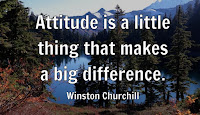Back in the 1980s (if I'm wrong about the date, please let me know--that's how I learn)--as I say, back in the 1980s Merit as a measure of achievement became a tarnished word. No longer did one need to show talent, or giftedness, or even keen interest in a topic, subject, or endeavor--all one needed to do was make an attempt. This was the era of treats/awards/recognition for all.
I know you think this is going to be a defense of Merit, but you'd be wrong. Sorry, no cigar.
Neither is it going to be a defense of the Everyone Is a Winner practice.
Today we're going to make a somewhat in-depth study of Dabbling. Let's start with a definition:
Dabbling - engaging in an activity superficially, or without serious intent; playing around; puttering; tinkering.
(The above is an amalgam from various sources.)
There's also a definition that applies only to ducks who bob for their food; it's called dabbling, and they're sometimes known as dabblers. But that's not what we are.
Back to our subject: Dabbling.
I was a bit taken aback by my Roget's Thesaurus which appeared to delight in pointing out the superficial, non-serious, and (implied) hardly worth mentioning, interest
Today I want to focus on the positive benefits anyone can reap through Dabbling.
Take art--I've recently renewed my acquaintance with watercolors, cold-press paper, natural vs. synthetic bristles, mops/hakes/riggers/round points--the entire enchilada. I've bought and borrowed books, found a painting partner (that's a plus--I can learn a lot from her), and managed to work my way through several lessons in a book to re-learn anything I had once been taught (decades ago).In no sense of the phrase can I call myself a serious artist. In a word, I dabble. And I love it! It's fun, it's crazy, it lifts me up if I'm in a blah place. The results don't have to be showable, not even to my nearest and dearest; they're simply what happens when I play around, putter, tinker . . . you know, dabble.
However, if I had a mom with a bare refrigerator door, I'd be awfully pleased if she used her cute magnets to put one of my paintings up for public gaze.
-----
Dabbling is more than just filling in time. Whatever your area of Dabble, you'll be engaging your brain (this is guaranteed, though not by me), encouraging it to work with your other organs to see, hear, smell, taste, feel more, recognize more, learn more about the physical world. I love to read, but unless the book is musty (definitely an olfactory sensation), all I do is see the pages and try to engage emotionally with the story.
Doing something else--art, woodworking, sewing or other needlework, tinkering with motors, making a garden, designing a gazebo or pergola for your back yard (you don't to actually build it, just designing it is good for the brain), thinking up games for your grandkids or practicing  your reading techniques for the read-aloud time at the library--any of this, and more, can engage your brain and through it, the other organs that keep you alive and perking along. You don't have to go for a Ph.D. in anything (unless you really want to)--just play around, try things out; revel in the joy of not having to reach a standard of achievement.
your reading techniques for the read-aloud time at the library--any of this, and more, can engage your brain and through it, the other organs that keep you alive and perking along. You don't have to go for a Ph.D. in anything (unless you really want to)--just play around, try things out; revel in the joy of not having to reach a standard of achievement.
In a word--Dabble!
-----
At the start of this essay, you probably expected me to defend Merit as the only barometer for human achievement. I hope you've given up that expectation--I do still think, and probably always will, that Merit is a valid method for awarding recognition.
Look at the Olympics--look at the US World Series in baseball--look at the numerous awards given to authors, journalists, musicians, artists, scientists, outstanding citizens (you name it, there's an award for it) . . . . We do applaud the excellence, even the beauty, of performance.
Yes, I'm still all for that.
But for a great majority of us, excellence and beauty are within reach so long as we don't let go of our enjoyment. We don't have to let art or music or any of our activities overshadow our joy in living. We don't have to choose: our families and friends versus the pursuit of greatness. So what if we don't win a Nobel Prize? Or a Pulitzer? Or an Oscar? Did we have the excitement of learning and doing something, like a sport or music or helping out at a homeless shelter? Did we see beauty somewhere in our world, despite conditions we didn't think could possibly exist?It may not have been a lifelong endeavor, but it certainly doesn't have to be seen as superficial. Or merely playing around.
Dabbling can be done with serious intent, so long as we remember to let joy come in.
Why not try it?
Blessings,
Thursday's Child













